
Dark Secrets About Flying Revealed By The Pros | Loungtastic
In spite of less leg room, straight-backed seats, dismal food options, and constant delays, air travel is more popular than ever. Don’t believe us? The air travel industry breaks the record for number of people flying each and every year 4+ billion people fly! That’s nearly half the world’s population taking part in this massive industry. And yet much of the process remains a mystery to us.has been used or how that coffee was made.
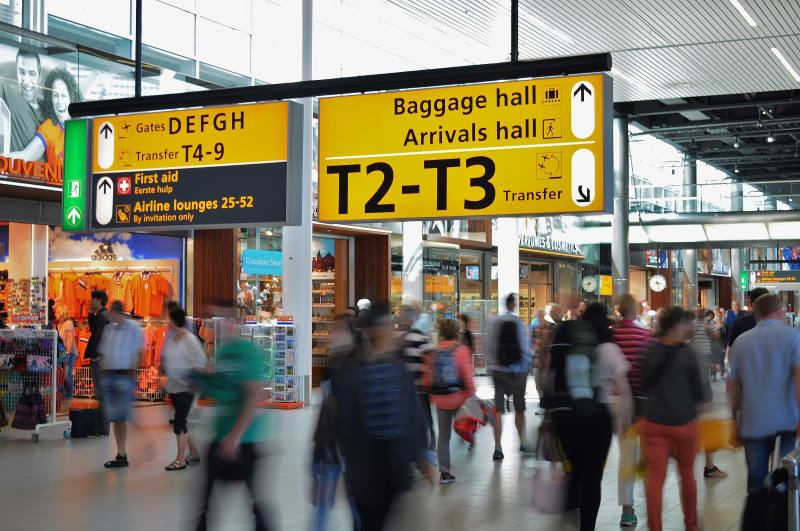
The pros themselves have a curious predilection for sharing the secrets of the skies—albeit in an anonymous manner. In fact, confessions from air travel industry vets from across the web have provided us with a dizzying array of things we’ve never thought about the many times we’ve nestled into those cramped, scratchy seats
Though most flight attendants are consummate professionals and aren’t likely to divulge their opinions on what’s happening behind the scenes to the passengers anxiously awaiting takeoff, the internet offers a comforting blanket of anonymity to voice their true thoughts. Thanks to these confessions, we can share some of the nitty-gritty details you never thought about while traveling in the clouds.
25. Those headphones aren’t as new as they seem.
According to one person who previously worked at one of the warehouses that supply airlines with headphones, even the headphones that come wrapped aren’t new. Airlines will have the headphones cleaned and re-packaged.
headphones cleaned and re-packaged. That’ll make you think twice about forgetting your earbuds at home.
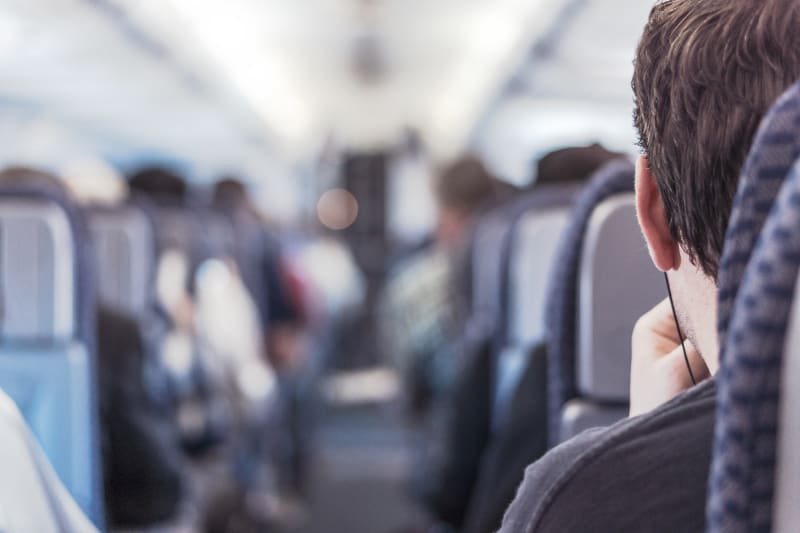
Gratisography
24. The pilot might be asleep during the flight.
Pilots are allowed to be on duty for 16 hours without a break. If you can even imagine being on duty that long, add on the pressure of safely carrying hundreds of lives to their destination. For long-haul flights, there are two pilots so that
one can take a short nap while the other mans the controls. That sounds reassuring, until you learn that in one survey, half of the pilots admitted to falling asleep “involuntarily” mid-flight. Better hope the co-pilot is up to snuff.
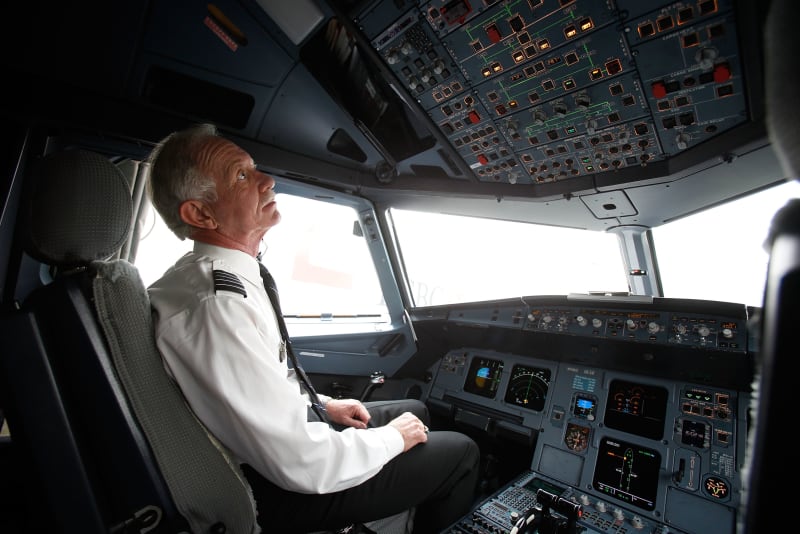
Getty Images News / Pool
23. You should pay attention to how the oxygen masks work.
Stop ignoring the safety presentation before takeoff—it contains key information that could literally save your life. For instance, you may not have known that the moment the oxygen masks fall, you’ll
have about 15 minutes worth of oxygen.
This is easily more than enough of time for the pilot to lower the airplane to a lower altitude where you can breathe easily. However, at altitude, you’ll only have about 15 to 20 seconds to secure your mask before passing out. When they tell you to put your mask on before helping others, they mean it.
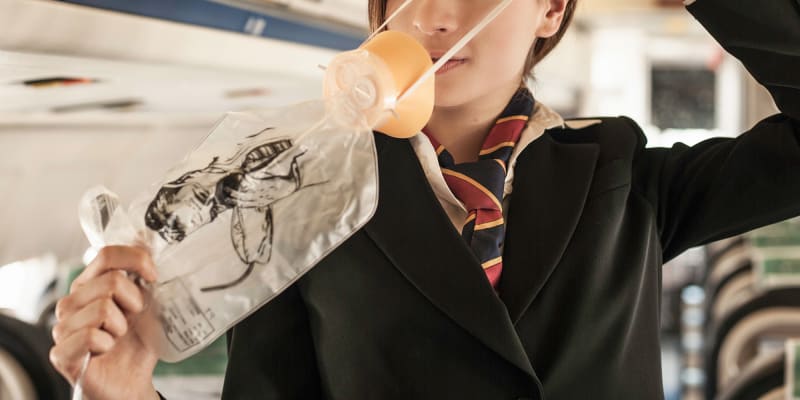
Getty Images
22. They dim the lights to help you out.
You’ve surely noticed that the lights go down in a plane just before landing, even in the middle of the day. In a scenario where you may have to evacuate the plane once you land, the dim lights will allow your eyes to adjust to suddenly being outside. This makes it easier for you to see your surroundings and escape safely.
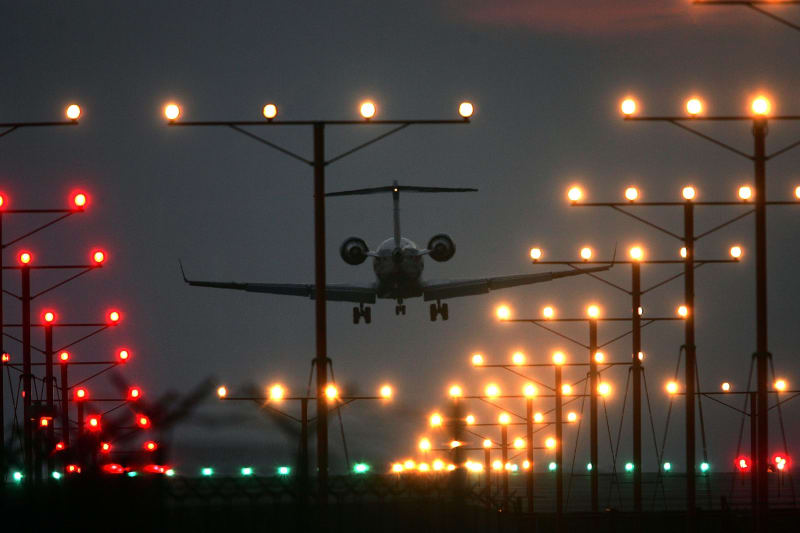 Getty Images News / David McNew
Getty Images News / David McNew
21. You really should turn your electronics to airplane mode.
When they ask you to turn your electronic devices off or into airplane mode, you should do it. No, it’s not going to bring the plane down, but it can really annoy your pilot. Hearing the interference of hundreds of cellphones can cause them to miss a signal or communication from air traffic control. On the other hand, one individual, whose sister is a flight attendant, said that after her sister orders everybody to turn off their electronics, she hides in the back and starts texting.
 yeaJESHOOTS
yeaJESHOOTS
20. The food can be a little iffy.
According to one man whose dad works for a large airline, the pilot and co-pilot aren’t allowed to share a meal and they never given the same food when they receive their separate meals. This is a measure that airlines take to prevent food poisoning. Is this really a logical concern? Maybe. We’re just glad they’re taking precautions.
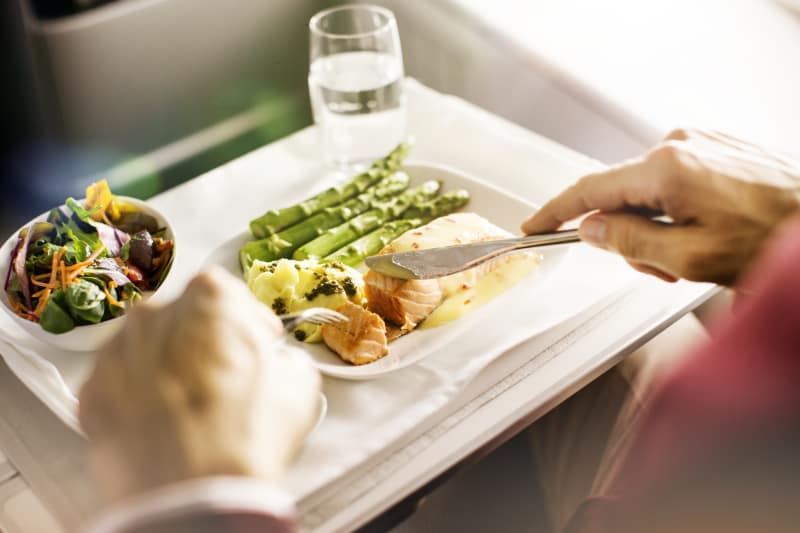
Dominik Mentzos for Lufthansa
19. Think twice about having your pets fly.
According to an aircraft fueler, airlines will do their best to take care of your pets, but there are a few things that can’t be avoided. The animals are, obviously, kept in their crates so they definitely experience some confusion and anxiety with all the hustle and bustle around them. And don’t forget about the noise on the ramp. Most people in this area wear ear protection, so you can imagine how bad it probably is for your pet.
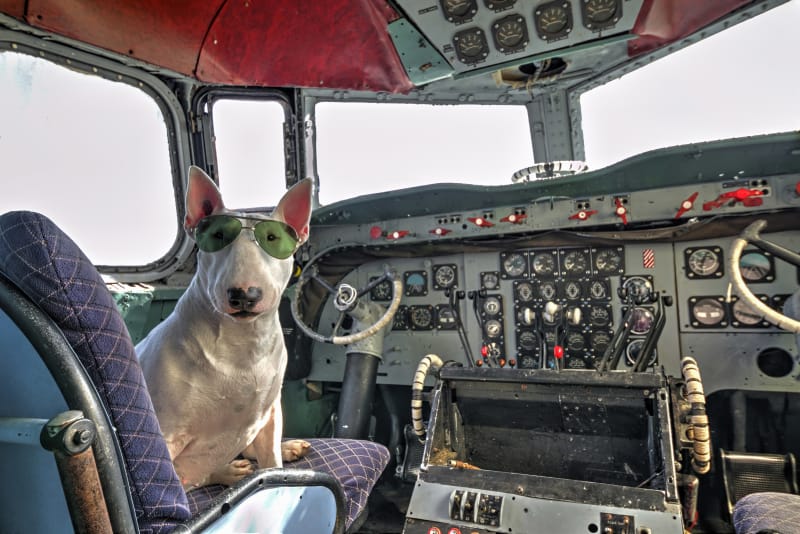 Alice van Campen/Caters News
Alice van Campen/Caters News
18. The pilot is pretty powerful.
The airplane captain has the same power as a ship captain, which is to say, quite a bit of it. The pilot in command can order any trouble-making passenger to be handcuffed in order to hand them over to the police after landing to be formally arrested.
They can also write fines and take the will of dying passengers. Talk about responsibility.
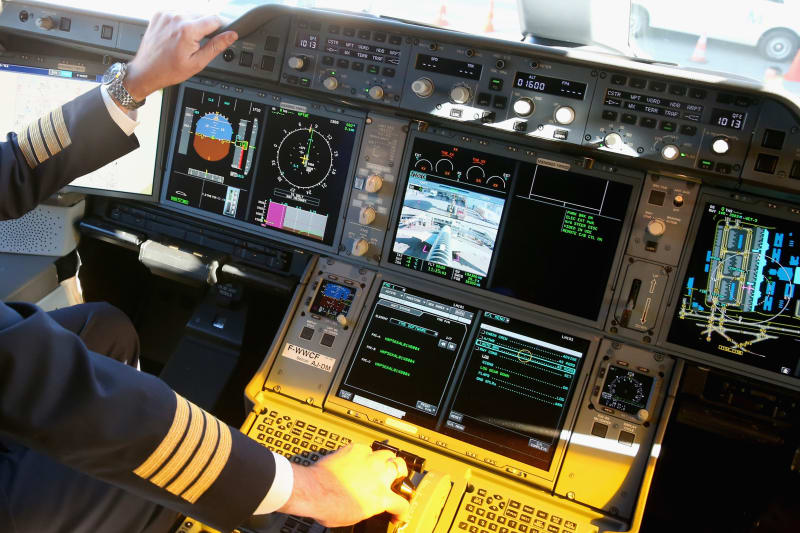 Getty Images News / Alexander Hassenstein
Getty Images News / Alexander Hassenstein
17. No one seat is safer than others.
You may have read studies that say middle seats in the back of an airplane are the safest. Based on the details of aircraft accidents, that certainly appeals to be true; the fatality rate for the front third of the plane is 38 percent, the middle third’s is 39 percent, and the back third’s rate is 32 percent. And obviously, passengers near an exit are more likely to get out of a crash alive.
That may have you running for a back middle seat near an exit, but these numbers don’t take into
account the circumstances surrounding an accident.
If you’re in the back middle seat and the plane’s tail takes a hit, you won’t be in a better position. There’s a reason no one seat is considered safer than the others. Fear not, though—flying has never been safer. No matter where you sit, you’ll get to your destination with no problems.
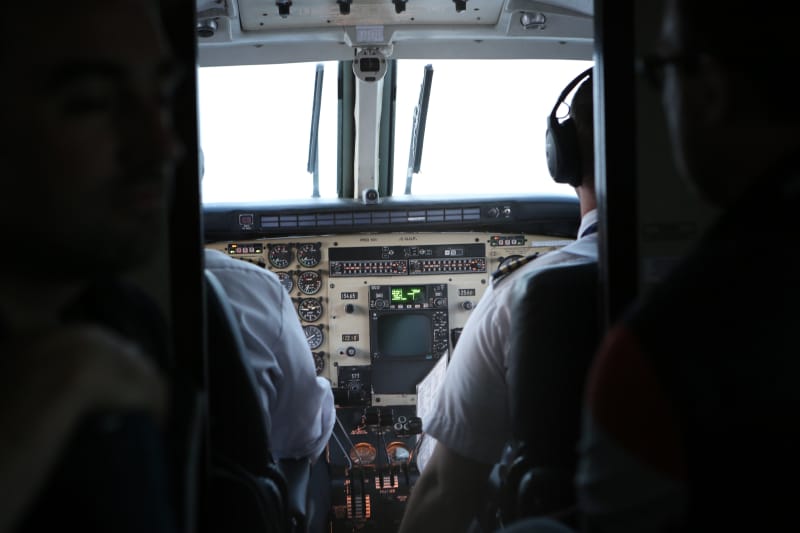 Life Of Pix
Life Of Pix
16. Stay away from water that doesn’t come out of a bottle.
A former Lufthansa cargo agent told any concerned passengers to stay far away from water that doesn’t come out of a bottle. The ports to remove lavatory waste and refill the aircraft with potable water are within feet of each other. These ports are sometimes serviced consecutively and by the same person. Even then, some flight attendants have admitted to filling up water bottles with water from the holding tanks. Needless to say, you shouldn’t fill up your water bottle from the lavatory tap.
 Huffington Post
Huffington Post
15. Don’t drink the coffee or tea.
You should also stay away from coffee, tea, and other drinks that use water. The reason? The holding tanks for water are usually as old as the plane and they aren’t cleaned regularly, if at all. Stick with bottled water, soda, or juice; if you must have coffee, hit the Starbucks in the concourse before boarding.
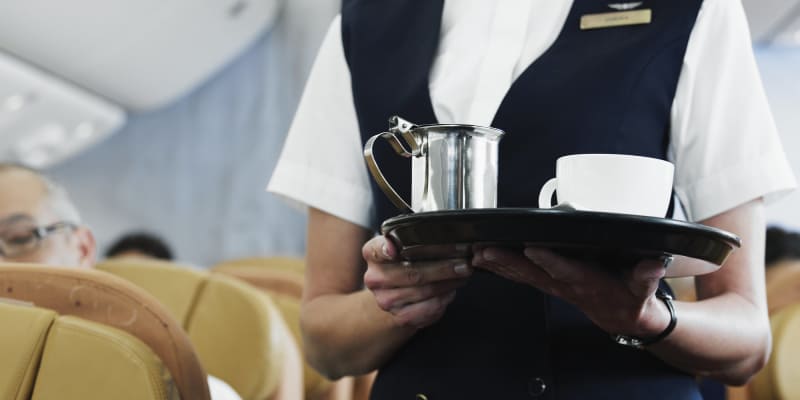 Huffington Post
Huffington Post
14. Your bag will get beaten up.
According to a bag handler, bag handlers will usually ignore warnings or instructions on bags such as “fragile” or “this side up” in the interest of time. The handler even went as far as to say that they’ll do the opposite of what the baggage says because they have to find a way to make all that baggage fit into the cargo pit. However, he did mention that if there is a “i heart baggage handlers” tag on your bag it will probably get special treatment. Worth a shot!
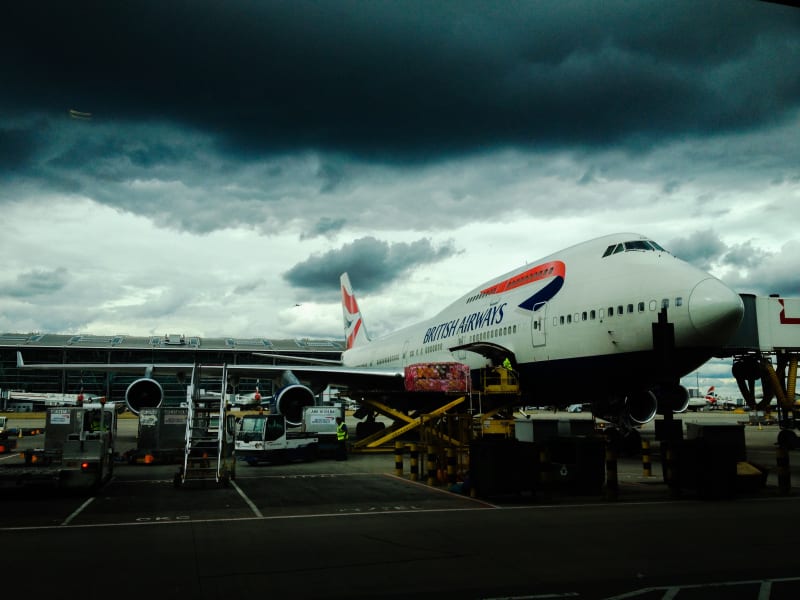 Unsplash
Unsplash
13. Don’t trust the lavatory locks.
Most people don’t know that the lavatories can be unlocked from the outside. There is a mechanism, usually behind the no smoking badge, that allows you to slide the bolt and unlock the door. It’s not there for passengers looking to play a prank though. In the unlikely event that someone becomes incapacitated—or involved in illegal activity—the flight attendants need a way to open the door.
 Riskology
Riskology
12. Don’t forget to lock your bags.
Lock all of your bags, including your carry-on bags. If you gate-check your bag, that bag is open to anyone, including security, the gate agents, and the ramp agents. Even if you carry it on, don’t assume that just because you wouldn’t go rifling through someone else’s unmentionables that your fellow passengers wouldn’t hesitate to root around for anything valuable in your bag.
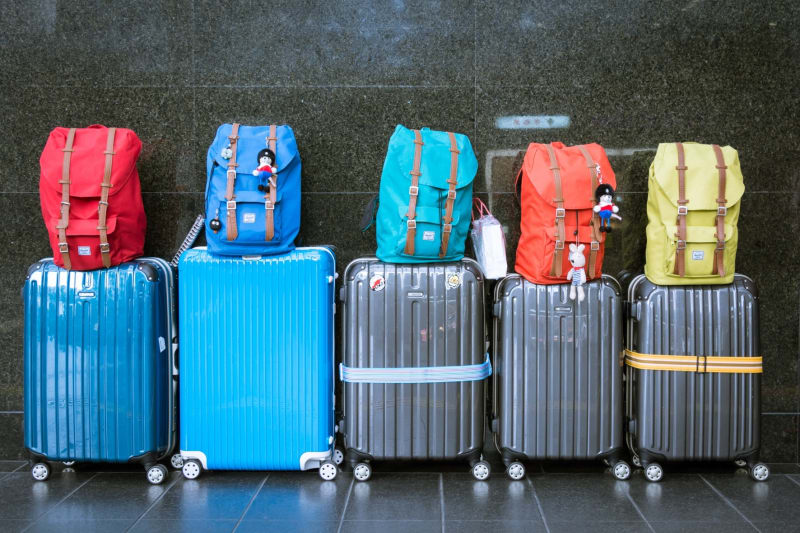 tookapic
tookapic
11. You can (and should) definitely tip your flight attendant.
Did you know that you can give your flight attendant tips? Most people don’t think to do it, but your FA will definitely accept. Give it a try if you’re on a long-haul flight and want them to keep the drinks coming. Plus, it’s always nice to give them recognition for a job well done—they usually go unappreciated.
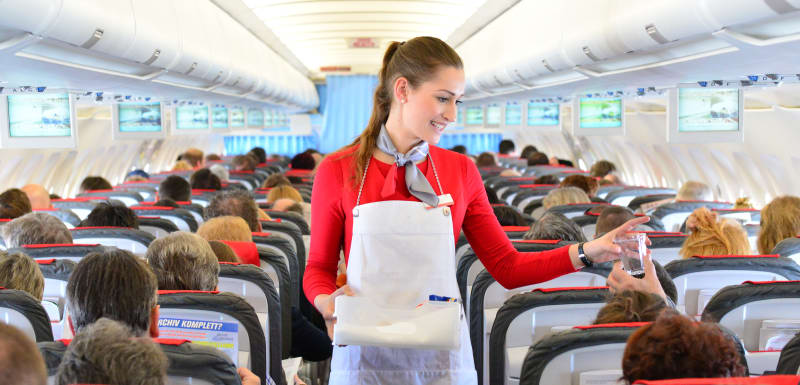 AES Cabin Crew
AES Cabin Crew
10. You might be flying next to human organs.
Often, you will be sharing a flight with human remains or organs. And they’re not necessarily in the cargo hold either. If you see a locked cooler in the overhead baggage bins, there’s a good chance it contains human organs being transported for medical or scientific use. There’s no real reason to get freaked out, but it’s a nifty fact you can share with a fellow passenger.
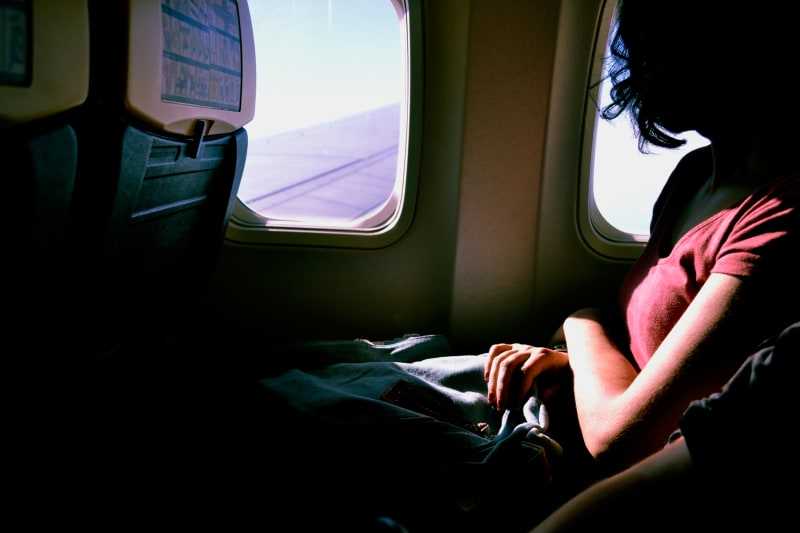 Unsplash
Unsplash
9. Big airlines don’t always use the most experienced pilots.
Just because you’re on a major airline that doesn’t mean that the pilot who is flying your plane has tons of experience. For instance, national and major airlines usually start looking at hiring a pilot once he or she has 5,000 hours of flight experience. While experience doesn’t necessarily correlate with ability, it’s comforting to know that they’re typically picking the best of the best.
However, it’s common for people who buy tickets from Delta, United, or American to fly on a subcontractor. The pilots on these flights from smaller airlines may have a fraction of the experience that the big mainline carrier pilots have. Granted, that doesn’t mean they don’t know what they’re doing. Just be aware you may not be getting an industry vet with decades of experience.

Paul Hackett/Reuters
8. You should choose cash over vouchers.
Airlines almost always overbook—it’s a fact of life. It’s how they ensure they make money, because you’d be surprised at how many people don’t show up to flights. Usually, overbooking doesn’t cause any problems. But every once in a while, more people than anticipated actually do show up for the flight, which means some travelers are going to be bumped. If that happens to you, your airline may offer passengers a voucher in exchange for being voluntarily bumped.
The pros say to refuse to volunteer and insist on a cash payment instead. If you’re involuntarily denied boarding, you’re entitled to a cash payment, on the spot. This can net you up to $1,300 or 400 percent of the value of the one-way fare depending on the length of the delay.
The more you know…
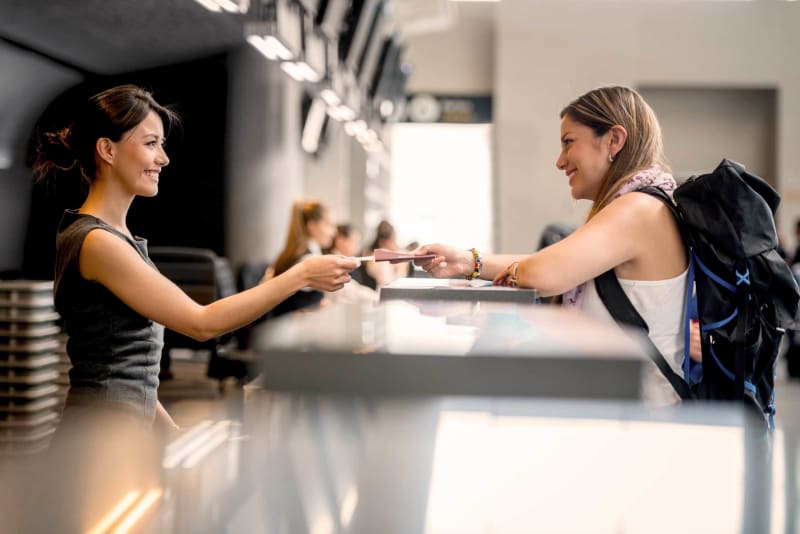 iStock
iStock
7. The cheapest days to buy and the cheapest days to fly aren’t the same thing.
You’ve probably heard the best day to buy plane tickets is on a Tuesday. That may actually be true, but that doesn’t mean you need to only fly out on Tuesdays. It’s true that Tuesday and Wednesday are the cheapest days to fly, but you might be surprised to learn that Saturday is on that list too. If you fly when most people would rather be asleep (early morning or overnight), you’ll get a better deal then too. Just avoid flying on Fridays or Sundays and you’ll probably save some serious coin.
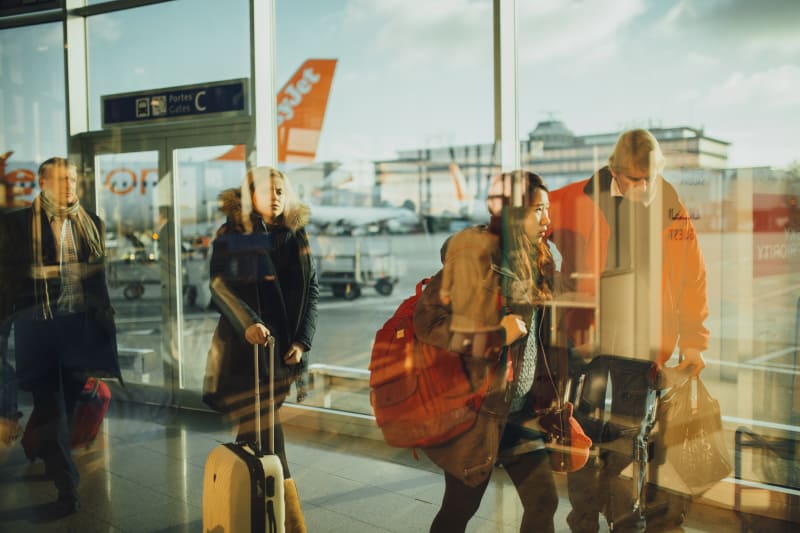 Pexels
Pexels
6. Some flight attendants only get paid when they’re in the sky.
Every airline pays their employees differently but a few of the major American carriers pay their FAs hourly. These hourly rates are calculated from the time the airplane door is closed until the time it is opened upon landing—this is often called block time. Any of their time spent in the terminal, preparing the airplane, doing safety checks, and boarding and deplaning is unpaid time.
Some of the pros actually said they have seen coworkers overlook issues they should normally fix just to get in the air and start making money. It’ll assure you to know many more responders said their colleagues are true professionals and wouldn’t put passengers in danger just to make a quick buck.
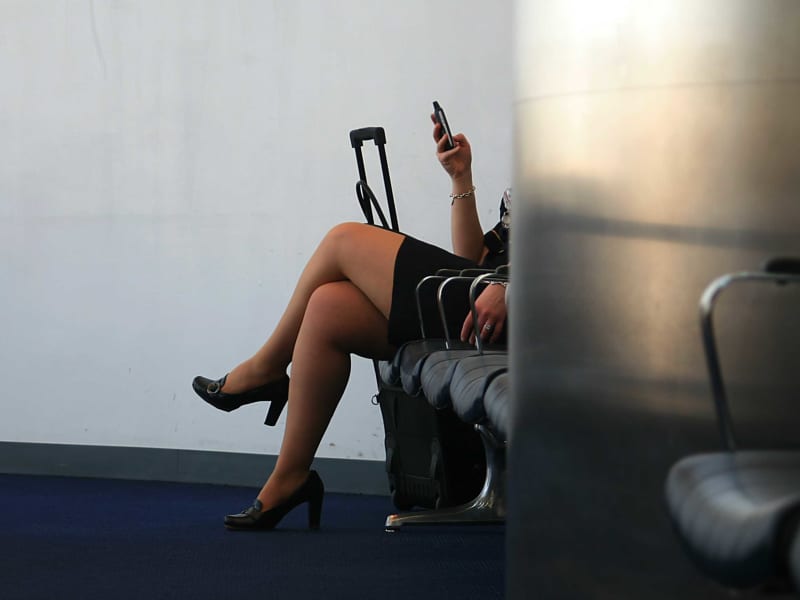 Delta Air Lines
Delta Air Lines
5. Planes land hard in bad weather for a reason.
Flying in bad weather can be nerve-wracking for even the most experienced of fliers. We’ve all experienced turbulence, but what gets people the most are the landings that are anything but smooth, especially when you know there may be water or even ice on the runway. When your plane lands hard during bad weather, that is actually intentional. The plane needs to land hard when there is water on the ground to prevent hydroplaning. Trust your pilot!
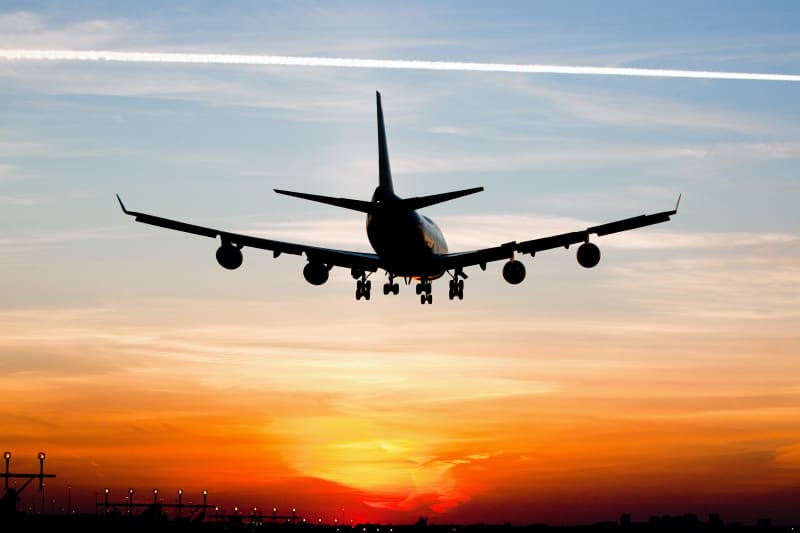 Delta
Delta
4. The cabin crew must meet certain requirements.
It’s not 1950 anymore! There are a few more requirements for flight attendants than being a pretty woman with a nice smile. That said, there are very strict physical attributes they’re looking for. Flight attendants must be between 4’11” and 6’3”. That’s a pretty wide range but what they’re looking for is how high you can reach; if you can’t help passengers get their bags in and out of the overhead storage bins, you probably won’t be a good choice. Attendants’ weight must be proportional to their heigh and they must have at least 20/30 vision.
While they don’t require supermodel-esque beauty anymore, airlines also have stringent requirements when it comes to personal grooming. Hair must be collar-length or shorter and only in natural colors. Piercings and tattoos are not allowed. Makeup must be minimal. Men must be clean-shaven. You may be rolling your eyes at these potentially outdated stipulations, but it puts skittish passengers at ease by projecting an image of professionalism and letting them know what they can expect on any flight across the world.
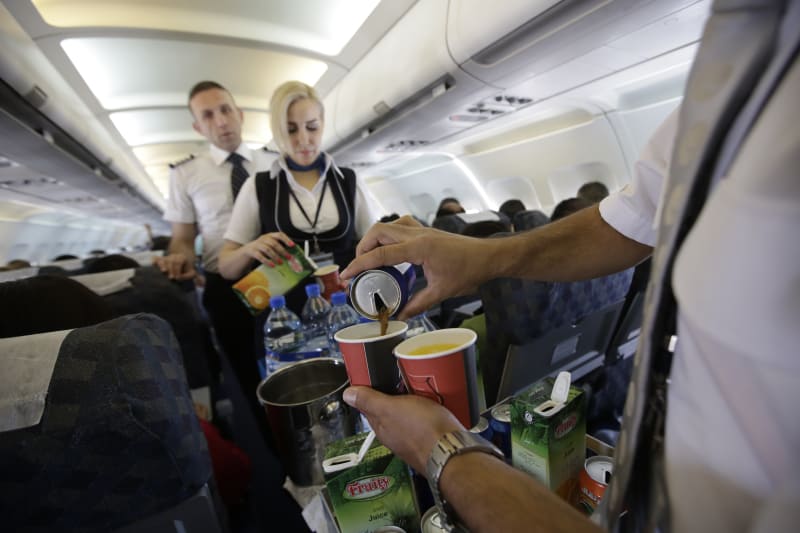 AFP / JOSEPH EID
AFP / JOSEPH EID
3. Lightning strikes are more common than you think.
Apparently planes are struck by lightning all the time. It’s estimated that each U.S. airplane is struck by lightning at least once a year. Surprisingly, sometimes it’s the planes themselves that trigger lightning strikes if they’re traveling through a heavily charged part of a cloud. There’s really no reason to worry though—the last crash attributed to a lightning strike was in 1967.
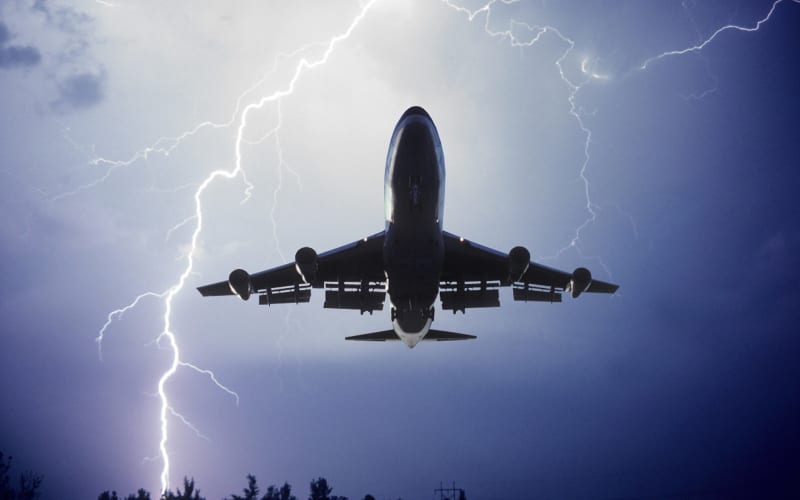 Erik Simonsen
Erik Simonsen
2. There are a few reasons your bag may have gotten lost.
One of the worst parts of flying is probably lost baggage and how often it seems to happen. 2023 was a historic low for baggage losses, though, at 6.5 bags lost per 1,000 passengers. That number has dropped by half across all international airlines in nearly 10 years. That said, it still happens. Confused by how this is still going on? It’s probably for one of the following reasons.
1) TSA may have pulled your bag for an extra screening—maybe for a reason and maybe at random, but either way they could have taken too long doing it and the bag didn’t make it on the flight.
2) Somebody in the bag room made a mistake. Mistakes happen. Blame the new guy.
3) Your bag got caught somewhere or it was pulled off for the wrong flight. That explains why your bag is in Dulles while you’re in D.C.
4) After you checked your bag at the curb, they were too busy to bring it on time.
5) You checked your bag too late. You can blame yourself for this one.
6) You checked your bag too early. If your bag is sitting around for six hours, it’s likely they shoved it in a corner and forgot about it.
7) It fell off the bag cart and nobody noticed. Better hope they start looking!
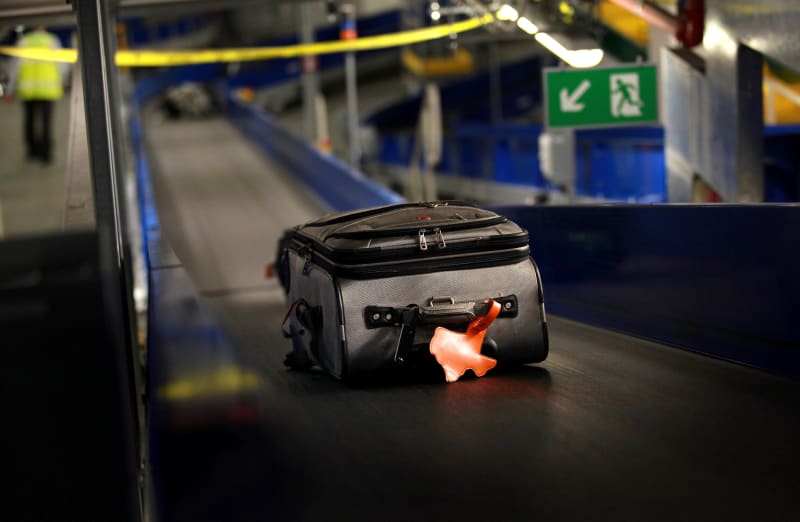 Getty Images News / Peter Macdiarmid
Getty Images News / Peter Macdiarmid
1. The plane is way grosser than you think.
While most people think the “recycled” air in planes is what causes illnesses, take heart: the air is constantly filtered (about 20 times an hour) through hospital-grade HEPA filters. What you really need to watch out for are contaminated surfaces. While the trays are far and away the germiest part of a plane (don’t rest any food on it without a napkin!), other surfaces like the armrests, seat belts, and buttons in the lavatory are disgustingly dirty and are rarely cleaned due to time constraints.
The pillows and blankets usually aren’t new, nor are they cleaned. They are just folded and re-used. Stock up on that Vitamin C and hand sanitizer before you hit the tarmac.
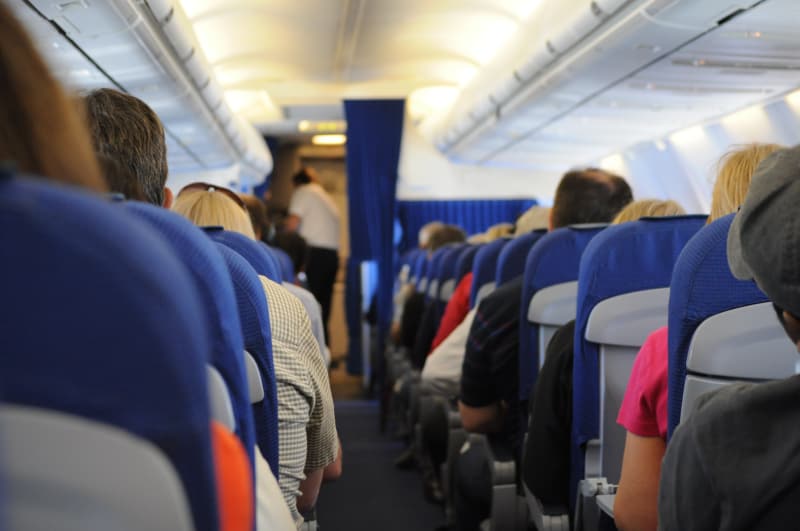
1 You’re probably flying with dead bodies.
Airlines need to make money however they can, and that includes taking on additional cargo like corpses and body parts. Ever wonder how donated kidneys make it from St. Louis to Dallas, or a body is flown from one city to another? Now you do.
—>2 You should never, ever drink the coffee or tea.
Your commercial flight has only three possible ways of getting the water for that fresh brew: bottled (too expensive, you’ll need to fly private for that), bathroom tap (the same sink someone may have used to deal with air sickness after a bout of turbulence), or from a fresh tap water holding tank that’s positioned just a few inches from the human waste and trash tank on most commercial flights. You do the math, and consider a can of seltzer or bringing your own Starbucks on board.
—>3 Cabin lights get dimmed for a reason.
It’s not mood lighting, people. It’s for the sake of your eyes adjusting more easily to the outside world in the event of a crash upon landing. Less soothing than thinking your pilot just wants to create a spa-like environment, right?
—>4 Your floatation device may be missing.
While airplane designing minds decided long ago that storing floatation devices and vests under seat cushions would be a great way to maximize space and safety, they never accounted for the popularity of thieving passengers. It turns out those vests are one of the top stolen items on airplanes, and the crew hardly has time to notice. Make sure you check under your seat before taking off.
—>5 Your cell phone won’t make the plane crash.
But the signal censors up front in the cockpit are pretty sensitive, so if your pilot is up front trying to get clearance for a takeoff and you plus 30 of your favorite seat mates can’t just enjoy airplane mode for a few minutes — you’re going to delay everyone. Don’t be that person.
—>6 Nobody can tell you not to breastfeed.
If you’re up in the air and your baby is hungry or cranky, it’s your right to feed. If the passenger next to you complains or causes a stir, the cabin crew is usually obligated to relocate them, not you.
—>7 Bad passengers are seated in the kiddie section.
If for some reason your seat changes last minute and you find yourself in the middle of a family of 14 young children, it’s likely because you did something to annoy the gate agent. Yes, they can punish you, so it’s best not to be rude or demanding.
—>8 Tipping is actually a custom.
The airlines don’t talk about it much because they’re all in an effort to make their planes seem cheaper than anyone else’s, but tipping has been a long understood custom of better-heeled travelers. If your flight attendant treated you well, don’t be a stranger to the $5 bill in the handshake technique at the end of your flight. Or, if you’re looking for the best possible treatment, try bringing a fully sealed box of chocolates from duty-free on board to give to the attendant helping you the most. If you’re on a long flight from JFK to Marrakesh, your effort will certainly be worth it when you ask for your 16th cup of water and a third pillow.
—>9 Your frequent flier account has a secret section where gate agents and phone representatives leave remarks.
Yes, remarks about your personality and how you treated them. So be nice — you’ll never make it to platinum elite as a sourpuss.
—>10 Even if you’re in first class, your pilot probably isn’t eating the same meal as you.
Not because he doesn’t love beef stroganoff at 35,000 feet above ground — but because most airlines don’t want to risk an entire plane full of passengers and their pilot getting food poisoning.
—>11 You should always choose online check-in if it’s available to you.
This 24-hour window before your flight takes off is literally your best shot at upgrading your seat or changing for a more desirable one. If you miss this window, even your gate agent might have a problem switching you.
—>12 Your pilot is humoring you.
When your pilot says “rough patch of air” or “turbulence” he or she usually means, “We’re flying through a horrible thunderstorm.” And yes, your plane is lightly being pelted with lightning. Don’t worry — that’s normal, but passengers tend to go nuts when they hear the truth so it’s usually not revealed.
—>13 The smoothest ride is right over the wing.
If you’re planning to sleep, pick a seat there.
—>14 There’s not really a George onboard.
If you hear your pilot make a reference to that name, it’s the nickname for autopilot and usually that means your real pilot wants to take a nap, visit the lav, or eat the Philly cheesesteak he smuggled onboard from his last stop.
—>15 The crew needs to rush you to their seat so they can get paid.
Did you know that getting everyone seated isn’t just a takeoff priority — it’s that the majority of air crews don’t start getting paid until the cabin door closes. So move it along!
—>16 Many flight attendants are taught self-defense as part of mandatory training.
Don’t mess with your meal service, because someone may come out with a roundhouse kick if you don’t act like a lady or gentleman.
—>17 Flight attendants love those free sanitary pads from the bathrooms.
that! – it’s about sopping up spills and stains more efficiently than with the lower quality paper towels they’re actually given. If your bathroom is emptied of pads, it’s probably because someone spilled their cocktail.
—>18 Don’t always believe the seat hype.
While the exit rows definitely offer more leg room, they typically lack the ability to recline. If you’re the type who likes to nap, cross this row off your list. They also don’t offer underseat storage, a full-size tray table, or a magazine pocket.
—>19 Coach blankets aren’t washed frequently — but first class may be.
If you’re offered a fleece blanket on board, just know that many people before you have been offered the same exact one. The rule is “cheap blankets get cheap treatment,” according to a gate agent for British Airways. If you’re flying in first class, the blankets are often made with plusher materials and treated to a daily cleaning. Even daily washing might not do you much good in the germs department though. Consider bringing your own wrap or scarf.
>—>20 There’s a reason your flush is so loud.
When you do your business at home, your toilet relies on water pressure and gravity to force fluids and other things down the plumbing. When you’re in the air, changed pressure and turbulence make this near impossible, so a forceful vacuum is required to get your you-know-what from point A to point Bye.
Why do flights take longer?

Today, a non-stop flight from New York city to Houston, Texas takes about 3 hours and 50 minutes..In 1973, the same flight would have taken 2 hours and 37 minutes.
Why does it takes us longer to fly the same distance? The simple answer is FUEL EFFICIENCY Airplanes are able to save millions per year by flying slower. From 2002 to 2012 the price of fuel went up from $0.70 per gallon to over $3 per gallon. A 2008 associated press report said jetBlue saved $13.6 million a year by adding just under two minutes to each flight. Fuel costs are also why airlines are attempting to make planes weigh as little as possible. That involves changes to the plane itself, and charging customers fees for heavy luggage.
Flights also seem longer because of a practice called BLOCK PADDING. Airplanes add a few minutes to the expected arrival time to seem more punctual.
So… do not be fooled when airlines say you’re arriving ahead of schedule!
Lush foliage provides a bit of privacy to the founder’s first estate.
The view from the home just might be worth that $59 mil.
The home’s exterior truly has a charming feel.
We have a feeling Zuck will have plenty of boats to dock up on the pier.
Mark Zuckerberg just purchased two side-by-side mansions on Lake Tahoe totaling a whopping $59 million!
Why buy a lake house when you could buy an entire compound? Well if you’re a multi-billionaire like Facebook founder Mark Zuckerberg, it’s seems like a wise choice. The tech giant just purchased two side-by-side mansions on Lake Tahoe totaling a whopping $59 million, according to Variety.





More on the Hitman in Ortiz case…
The suspected gunman in David Ortiz’s shooting at a Dominican Republic bar was arrested Wednesday as part of a group that authorities said was offered nearly $8,000 for a coordinated hit on the former Red Sox star.
Ramon Martinez Perez, who goes by the alias Rolfie, was detained and is currently being questioned, Dominican authorities said. Eddy Vladimir Feliz Garcia, who was arrested at the scene of the Sunday night shooting at Dial Bar and Lounge in the eastern part of Santa Domingo, was charged Tuesday as an accomplice to attempted murder.
Two other men, Joel Rodriguez Cruz and Oliver Moises Mirabal Acosta, were also arrested; another suspect remains at large.
Authorities asked that Luis Alfredo Riva Clases, known as “The Surgeon,” turn himself in.
Prosecutors said in court documents that two men were seen on security camera footage talking with other people in two Hyundai sedans on a nearby street before two men got on a motorcycle to ride toward the bar.
Ortiz, 43, was shot in the back and suffered severe internal damage. The shot, which exited through Ortiz’s stomach, also hit one of the attackers in the leg.
Ortiz, a Dominican Republic native, had his gallbladder and part of his intestine removed by surgeons hours after the shooting.
Did you know they served?
10 Veterans Who Served In the Military
Didn’t know Clint Eastwood crashed in a WWII bomber! Not all actors had that ‘Hollywood’ life style from the get go. Some had the tough job of being in military service. These ten actors are household names, they’ve gone on to great things, and they all have one thing in common – they are veterans. Some of them made use of military education benefits to further their careers. Others used their experiences in uniform as the springboard for a life in the spotlight – thinking Chuck Norris here but was surprised about Mr T being on this list. Also didn’t know Clint Eastwood crashed in a WWII bomber.
Not all actors had that ‘Hollywood’ life style from the get go. Some had the tough job of being in military service. These ten actors are household names, they’ve gone on to great things, and they all have one thing in common – they are veterans. Some of them made use of military education benefits to further their careers. Others used their experiences in uniform as the springboard for a life in the spotlight – thinking Chuck Norris here but was surprised about Mr T being on this list. Also didn’t know Clint Eastwood crashed in a WWII bomber.
Gene Hackman
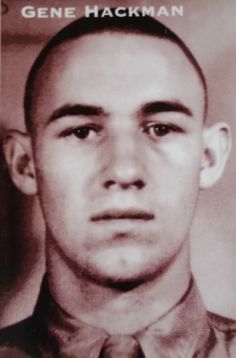 Hackman was born in San Bernardino, California, the son of Anna Lyda Elizabeth (née Gray) and Eugene Ezra Hackman. He has a brother, Richard. He has Pennsylvania Dutch (German), English, and Scottish ancestry, and his mother was born in Lambton, Ontario. According to a plaque in a city park, he worked for a time as a dog catcher for the local animal shelter. His family moved frequently, finally settling in Danville, Illinois, where they lived in the house of his English-born maternal grandmother, Beatrice. Hackman’s father operated the printing press for the Commercial-News, a local paper. As a young teenager Hackman was in some of the same social circles as the older Dick Van Dyke at that time. Van Dyke was friends with his older brother Richard. Hackman’s parents divorced in 1943 and his father subsequently left the family.
Gene lived briefly in Storm Lake, Iowa and spent his sophomore year at Storm Lake High School. At the age of sixteen, Hackman left home to join the United States Marine Corps, where he served four-and-a-half years as a field radio operator. He was stationed in China (Qingdao, and later in Shanghai). When the Communist Revolution was victorious in 1949, Hackman was stationed in Hawaii and Japan. After his discharge, he moved to New York, working in several minor jobs
Hackman was born in San Bernardino, California, the son of Anna Lyda Elizabeth (née Gray) and Eugene Ezra Hackman. He has a brother, Richard. He has Pennsylvania Dutch (German), English, and Scottish ancestry, and his mother was born in Lambton, Ontario. According to a plaque in a city park, he worked for a time as a dog catcher for the local animal shelter. His family moved frequently, finally settling in Danville, Illinois, where they lived in the house of his English-born maternal grandmother, Beatrice. Hackman’s father operated the printing press for the Commercial-News, a local paper. As a young teenager Hackman was in some of the same social circles as the older Dick Van Dyke at that time. Van Dyke was friends with his older brother Richard. Hackman’s parents divorced in 1943 and his father subsequently left the family.
Gene lived briefly in Storm Lake, Iowa and spent his sophomore year at Storm Lake High School. At the age of sixteen, Hackman left home to join the United States Marine Corps, where he served four-and-a-half years as a field radio operator. He was stationed in China (Qingdao, and later in Shanghai). When the Communist Revolution was victorious in 1949, Hackman was stationed in Hawaii and Japan. After his discharge, he moved to New York, working in several minor jobs
Elvis Presley
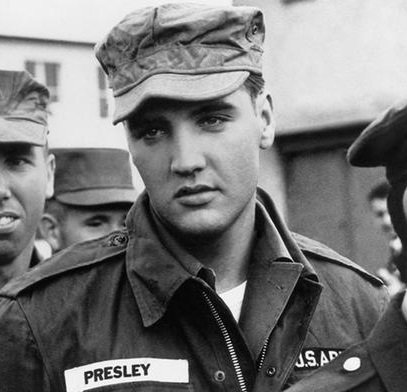 On March 24, Presley was inducted into the U.S. Army as a private at Fort Chaffee, near Fort Smith, Arkansas. His arrival was a major media event. Hundreds of people descended on Presley as he stepped from the bus; photographers then accompanied him into the fort. Presley announced that he was looking forward to his military stint, saying he did not want to be treated any differently from anyone else: “The Army can do anything it wants with me.”
Soon after Presley commenced basic training at Fort Hood, Texas, he received a visit from Eddie Fadal, a businessman he had met on tour. According to Fadal, Presley had become convinced his career was finished—”He firmly believed that.” But then, during a two-week leave in early June, Presley recorded five songs in Nashville. In early August, his mother was diagnosed with hepatitis and her condition rapidly worsened. Presley, granted emergency leave to visit her, arrived in Memphis on August 12. Two days later, she died of heart failure, aged 46. Presley was devastated; their relationship had remained extremely close—even into his adulthood, they would use baby talk with each other and Presley would address her with pet names.
After training, Presley joined the 3rd Armored Division in Friedberg, Germany, on October 1. Introduced to amphetamines by a sergeant while on maneuvers, he became “practically evangelical about their benefits”—not only for energy, but for “strength” and weight loss, as well—and many of his friends in the outfit joined him in indulging. The Army also introduced Presley to karate, which he studied seriously, later including it in his live performances. Fellow soldiers have attested to Presley’s wish to be seen as an able, ordinary soldier, despite his fame, and to his generosity. He donated his Army pay to charity, purchased TV sets for the base, and bought an extra set of fatigues for everyone in his outfit
On March 24, Presley was inducted into the U.S. Army as a private at Fort Chaffee, near Fort Smith, Arkansas. His arrival was a major media event. Hundreds of people descended on Presley as he stepped from the bus; photographers then accompanied him into the fort. Presley announced that he was looking forward to his military stint, saying he did not want to be treated any differently from anyone else: “The Army can do anything it wants with me.”
Soon after Presley commenced basic training at Fort Hood, Texas, he received a visit from Eddie Fadal, a businessman he had met on tour. According to Fadal, Presley had become convinced his career was finished—”He firmly believed that.” But then, during a two-week leave in early June, Presley recorded five songs in Nashville. In early August, his mother was diagnosed with hepatitis and her condition rapidly worsened. Presley, granted emergency leave to visit her, arrived in Memphis on August 12. Two days later, she died of heart failure, aged 46. Presley was devastated; their relationship had remained extremely close—even into his adulthood, they would use baby talk with each other and Presley would address her with pet names.
After training, Presley joined the 3rd Armored Division in Friedberg, Germany, on October 1. Introduced to amphetamines by a sergeant while on maneuvers, he became “practically evangelical about their benefits”—not only for energy, but for “strength” and weight loss, as well—and many of his friends in the outfit joined him in indulging. The Army also introduced Presley to karate, which he studied seriously, later including it in his live performances. Fellow soldiers have attested to Presley’s wish to be seen as an able, ordinary soldier, despite his fame, and to his generosity. He donated his Army pay to charity, purchased TV sets for the base, and bought an extra set of fatigues for everyone in his outfit
Chuck Norris
 Norris has described his childhood as downbeat. He was nonathletic, shy, and scholastically mediocre.His father, Ray, worked intermittently as an automobile mechanic, and went on alcohol drinking binges that lasted for months at a time. Embarrassed by his father’s behavior and the family’s financial plight, Norris developed a debilitating introversion that lasted for his entire childhood.
Norris has described his childhood as downbeat. He was nonathletic, shy, and scholastically mediocre.His father, Ray, worked intermittently as an automobile mechanic, and went on alcohol drinking binges that lasted for months at a time. Embarrassed by his father’s behavior and the family’s financial plight, Norris developed a debilitating introversion that lasted for his entire childhood.
He joined the United States Air Force as an Air Policeman (AP) in 1958 and was sent to Osan Air Base, South Korea. It was there that Norris acquired the nickname Chuck and began his training in Tang Soo Do (tangsudo), an interest that led to black belts in that art and the founding of the Chun Kuk Do (“Universal Way”) form. When he returned to the United States, he continued to serve as an AP at March Air Force Base in California. Norris was discharged in August 1962. He worked for the Northrop Corporation and opened a chain of Karate schools including a storefront school in his then-hometown of Torrance on Hawthorne Boulevard. Norris’ official website lists celebrity clients at the schools; among them Steve McQueen, Chad McQueen, Bob Barker, Priscilla Presley, Donny Osmond and Marie Osmond.
Jimi Hendrix
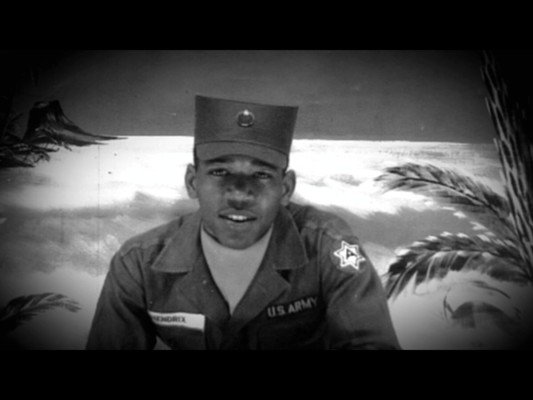 Before Hendrix was 19 years old, law enforcement authorities had twice caught him riding in stolen cars. When given a choice between spending time in prison or joining the Army, he chose the latter and enlisted on May 31, 1961. After completing eight weeks of basic training at Fort Ord, California, he was assigned to the 101st Airborne Division and stationed at Fort Campbell, Kentucky. He arrived there on November 8, and soon afterward he wrote to his father: “There’s nothing but physical training and harassment here for two weeks, then when you go to jump school … you get hell. They work you to death, fussing and fighting.” In his next letter home, Hendrix, who had left his guitar at his girlfriend Betty Jean Morgan’s house in Seattle, asked his father to send it to him as soon as possible, stating: “I really need it now.” His father obliged and sent the red Silvertone Danelectro on which Hendrix had hand-painted the words “Betty Jean”, to Fort Campbell. His apparent obsession with the instrument contributed to his neglect of his duties, which led to verbal taunting and physical abuse from his peers, who at least once hid the guitar from him until he had begged for its return.
In November 1961, fellow serviceman Billy Cox walked past an army club and heard Hendrix playing guitar. Intrigued by the proficient playing, which he described as a combination of “John Lee Hooker and Beethoven”, Cox borrowed a bass guitar and the two jammed. Within a few weeks, they began performing at base clubs on the weekends with other musicians in a loosely organized band called the Casuals.
Hendrix completed his paratrooper training in just over eight months, and Major General C.W.G. Rich awarded him the prestigious Screaming Eagles patch on January 11, 1962. By February, his personal conduct had begun to draw criticism from his superiors. They labeled him an unqualified marksman and often caught him napping while on duty and failing to report for bed checks. On May 24, Hendrix’s platoon sergeant, James C. Spears, filed a report in which he stated: “He has no interest whatsoever in the Army … It is my opinion that Private Hendrix will never come up to the standards required of a soldier. I feel that the military service will benefit if he is discharged as soon as possible.” On June 29, 1962, Captain Gilbert Batchman granted Hendrix an honorable discharge on the basis of unsuitability. Hendrix later spoke of his dislike of the army and falsely stated that he had received a medical discharge after breaking his ankle during his 26th parachute jump.
Before Hendrix was 19 years old, law enforcement authorities had twice caught him riding in stolen cars. When given a choice between spending time in prison or joining the Army, he chose the latter and enlisted on May 31, 1961. After completing eight weeks of basic training at Fort Ord, California, he was assigned to the 101st Airborne Division and stationed at Fort Campbell, Kentucky. He arrived there on November 8, and soon afterward he wrote to his father: “There’s nothing but physical training and harassment here for two weeks, then when you go to jump school … you get hell. They work you to death, fussing and fighting.” In his next letter home, Hendrix, who had left his guitar at his girlfriend Betty Jean Morgan’s house in Seattle, asked his father to send it to him as soon as possible, stating: “I really need it now.” His father obliged and sent the red Silvertone Danelectro on which Hendrix had hand-painted the words “Betty Jean”, to Fort Campbell. His apparent obsession with the instrument contributed to his neglect of his duties, which led to verbal taunting and physical abuse from his peers, who at least once hid the guitar from him until he had begged for its return.
In November 1961, fellow serviceman Billy Cox walked past an army club and heard Hendrix playing guitar. Intrigued by the proficient playing, which he described as a combination of “John Lee Hooker and Beethoven”, Cox borrowed a bass guitar and the two jammed. Within a few weeks, they began performing at base clubs on the weekends with other musicians in a loosely organized band called the Casuals.
Hendrix completed his paratrooper training in just over eight months, and Major General C.W.G. Rich awarded him the prestigious Screaming Eagles patch on January 11, 1962. By February, his personal conduct had begun to draw criticism from his superiors. They labeled him an unqualified marksman and often caught him napping while on duty and failing to report for bed checks. On May 24, Hendrix’s platoon sergeant, James C. Spears, filed a report in which he stated: “He has no interest whatsoever in the Army … It is my opinion that Private Hendrix will never come up to the standards required of a soldier. I feel that the military service will benefit if he is discharged as soon as possible.” On June 29, 1962, Captain Gilbert Batchman granted Hendrix an honorable discharge on the basis of unsuitability. Hendrix later spoke of his dislike of the army and falsely stated that he had received a medical discharge after breaking his ankle during his 26th parachute jump.
Charlton Heston
 In 1944, Heston enlisted in the United States Army Air Forces. He served for two years as a radio operator and aerial gunner aboard a B-25 Mitchell stationed in the Alaskan Aleutian Islands with the 77th Bombardment Squadron of the Eleventh Air Force. He reached the rank of Staff Sergeant.
Heston married Northwestern University student Lydia Marie Clarke, who was six months his senior. That same year he joined the military. After his rise to fame, Heston narrated for highly classified military and Department of Energy instructional films, particularly relating to nuclear weapons, and “for six years Heston [held] the nation’s highest security clearance” or Q clearance.” The Q clearance is similar to a DoD or Defense Intelligence Agency (DIA) clearance of Top Secret.
In 1944, Heston enlisted in the United States Army Air Forces. He served for two years as a radio operator and aerial gunner aboard a B-25 Mitchell stationed in the Alaskan Aleutian Islands with the 77th Bombardment Squadron of the Eleventh Air Force. He reached the rank of Staff Sergeant.
Heston married Northwestern University student Lydia Marie Clarke, who was six months his senior. That same year he joined the military. After his rise to fame, Heston narrated for highly classified military and Department of Energy instructional films, particularly relating to nuclear weapons, and “for six years Heston [held] the nation’s highest security clearance” or Q clearance.” The Q clearance is similar to a DoD or Defense Intelligence Agency (DIA) clearance of Top Secret.
Humphrey Bogart
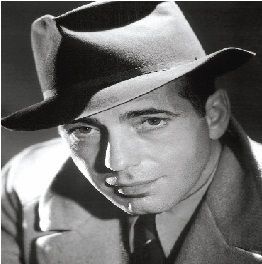 Bogart followed his passion for the sea and enlisted in the United States Navy in the spring of 1918. He recalled later, “At eighteen, war was great stuff. Paris! Sexy French girls! Hot damn!” Bogart is recorded as a model sailor who spent most of his sea time after the Armistice ferrying troops back from Europe.
It was during his naval stint that Bogart may have received his trademark scar and developed his characteristic lisp, though the actual circumstances are unclear. In one account his lip was cut by shrapnel when his ship, the USS Leviathan, was shelled, although some claim Bogart did not make it to sea until after the Armistice had been signed. Another version, which Bogart’s long-time friend, author Nathaniel Benchley, holds to, is that Bogart was injured while taking a prisoner to Portsmouth Naval Prison in Kittery, Maine. Changing trains in Boston the handcuffed prisoner allegedly asked Bogart for a cigarette, then while Bogart looked for a match, the prisoner smashed him across the mouth with the cuffs, cutting Bogart’s lip and fleeing. Recaptured, the prisoner was taken to jail. An alternate version has Bogart struck in the mouth by a handcuff loosened while freeing his charge, the other still round the prisoner’s wrist.
Bogart followed his passion for the sea and enlisted in the United States Navy in the spring of 1918. He recalled later, “At eighteen, war was great stuff. Paris! Sexy French girls! Hot damn!” Bogart is recorded as a model sailor who spent most of his sea time after the Armistice ferrying troops back from Europe.
It was during his naval stint that Bogart may have received his trademark scar and developed his characteristic lisp, though the actual circumstances are unclear. In one account his lip was cut by shrapnel when his ship, the USS Leviathan, was shelled, although some claim Bogart did not make it to sea until after the Armistice had been signed. Another version, which Bogart’s long-time friend, author Nathaniel Benchley, holds to, is that Bogart was injured while taking a prisoner to Portsmouth Naval Prison in Kittery, Maine. Changing trains in Boston the handcuffed prisoner allegedly asked Bogart for a cigarette, then while Bogart looked for a match, the prisoner smashed him across the mouth with the cuffs, cutting Bogart’s lip and fleeing. Recaptured, the prisoner was taken to jail. An alternate version has Bogart struck in the mouth by a handcuff loosened while freeing his charge, the other still round the prisoner’s wrist.
Mr T
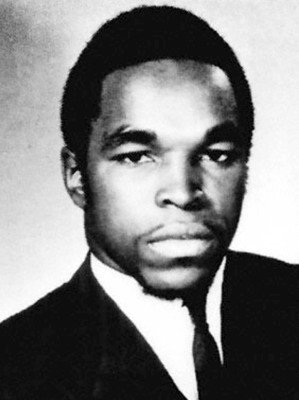 Mr. T ( Lawrence Tureaud)Tureaud attended Dunbar Vocational High School where he played football, wrestled, and studied martial arts. While at Dunbar he became the city-wide wrestling champion two years in a row. He won a football scholarship to Prairie View A&M University, where he majored in mathematics, but was expelled after his first year.
He then enlisted in the United States Army and served in the Military Police Corps. In November 1975, Tureaud was awarded a letter of recommendation by his drill sergeant, and in a cycle of six thousand troops Tureaud was elected “Top Trainee of the Cycle” and was also promoted to squad leader. In July 1976, Tureaud’s platoon sergeant punished him by giving him the detail of chopping down trees during training camp at Fort McCoy in Wisconsin, but did not tell him how many trees, so Tureaud single-handedly chopped down over 70 trees from 6:30–10:00 a.m., when a shocked major superseded the sergeant’s orders
Mr. T ( Lawrence Tureaud)Tureaud attended Dunbar Vocational High School where he played football, wrestled, and studied martial arts. While at Dunbar he became the city-wide wrestling champion two years in a row. He won a football scholarship to Prairie View A&M University, where he majored in mathematics, but was expelled after his first year.
He then enlisted in the United States Army and served in the Military Police Corps. In November 1975, Tureaud was awarded a letter of recommendation by his drill sergeant, and in a cycle of six thousand troops Tureaud was elected “Top Trainee of the Cycle” and was also promoted to squad leader. In July 1976, Tureaud’s platoon sergeant punished him by giving him the detail of chopping down trees during training camp at Fort McCoy in Wisconsin, but did not tell him how many trees, so Tureaud single-handedly chopped down over 70 trees from 6:30–10:00 a.m., when a shocked major superseded the sergeant’s orders
Tom Selleck
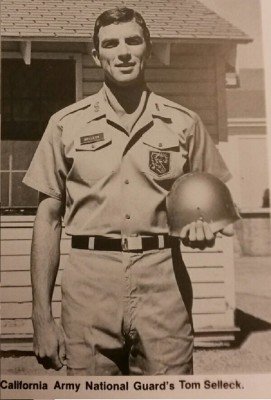 During the Vietnam War, Selleck was issued draft orders. To take some measure of control over the situation, he joined the California National Guard in the 160th infantry regiment. He served from 1967 to 1973. He later appeared on California National Guard recruiting posters.
The military left a strong impression on Selleck, who recalls his service with pride, “I am a veteran, I’m proud of it,” he said. “I was a sergeant in the U.S. Army infantry, National Guard, Vietnam era. We’re all brothers and sisters in that sense.” Upon returning to civilian life, he was dropped from his contract with Fox. “And then I was going to be drafted, and I got into an infantry National Guard unit and did six months active duty in the middle of my time at Fox,” Selleck said. “I had my job when I came back, and then they fired me.
During the Vietnam War, Selleck was issued draft orders. To take some measure of control over the situation, he joined the California National Guard in the 160th infantry regiment. He served from 1967 to 1973. He later appeared on California National Guard recruiting posters.
The military left a strong impression on Selleck, who recalls his service with pride, “I am a veteran, I’m proud of it,” he said. “I was a sergeant in the U.S. Army infantry, National Guard, Vietnam era. We’re all brothers and sisters in that sense.” Upon returning to civilian life, he was dropped from his contract with Fox. “And then I was going to be drafted, and I got into an infantry National Guard unit and did six months active duty in the middle of my time at Fox,” Selleck said. “I had my job when I came back, and then they fired me.
Hugh Hefner
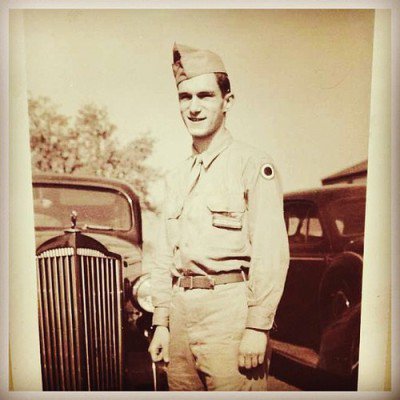 He’s known today as the swingingest guy on the planet and the man behind Playboy magazine, but before he became the biggest Playboy of them all, Hugh Hefner was an Army Soldier in World War II.
A descendant of Plymouth governor William Bradford from back in America’s colonial days, Hefner was born in Chicago in 1926. He always had smarts (he had an IQ rating of 152 as a child) and showed an interest in the journalistic life early on when he started a high school newspaper. Upon graduation in 1944 he enlisted in the Army as an infantry clerk; during Basic Training he won a sharpshooter badge for firing the M1 and made it through “Killer College,” in which troops went through maneuvers while throwing real grenades. Posted at Camp Adair in Salem, Oregon, and Camp Pickett in Virginia, Hefner contributed cartoons for Army newspapers.
He’s known today as the swingingest guy on the planet and the man behind Playboy magazine, but before he became the biggest Playboy of them all, Hugh Hefner was an Army Soldier in World War II.
A descendant of Plymouth governor William Bradford from back in America’s colonial days, Hefner was born in Chicago in 1926. He always had smarts (he had an IQ rating of 152 as a child) and showed an interest in the journalistic life early on when he started a high school newspaper. Upon graduation in 1944 he enlisted in the Army as an infantry clerk; during Basic Training he won a sharpshooter badge for firing the M1 and made it through “Killer College,” in which troops went through maneuvers while throwing real grenades. Posted at Camp Adair in Salem, Oregon, and Camp Pickett in Virginia, Hefner contributed cartoons for Army newspapers.
Clint Eastwood
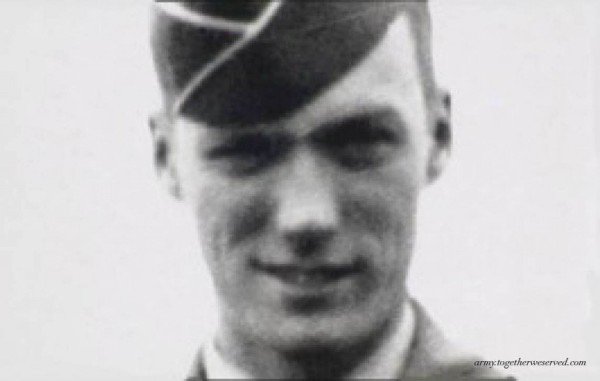 Clinton Eastwood, Jr. was born in San Francisco, the son of Clinton Eastwood Sr., a steelworker and migrant worker, and his wife Margaret Ruth (Runner) Eastwood, an IBM factory worker. He was nicknamed “Samson” by the hospital nurses because he weighed 11 pounds 6 ounces (5.2 kg) at birth. He has a younger sister, Jeanne, born in 1934.His stepfather was lumber magnate John Belden Wood (November 24, 1913 – February 18, 2004). Eastwood is of English, Irish, Scottish, and Dutch ancestry and was raised in a working class environment. Eastwood is descended from Mayflower passenger William Bradford and through this line is the 12th generation of his family born in North America and the 13th generation to live in North America.His family moved often as his father worked at jobs along the West Coast. They finally settled in Piedmont, California, where Eastwood attended Piedmont Junior High School. Shortly before he was to enter Piedmont High School, he rode his bike on the school’s sports field and tore up the wet turf; this resulted in his being asked not to enroll. Instead, he attended Oakland Technical High School, where the drama teachers encouraged him to take part in school plays. However, Eastwood was not interested. He worked at a number of jobs, including lifeguard, paper carrier, grocery clerk, forest firefighter, and golf caddy.
In 1951, Eastwood enrolled at Seattle University but was then drafted into the United States Army and assigned to Fort Ord in California, where he was appointed as a lifeguard and swimming instructor. While returning from a weekend visit to his parents in Seattle, Washington, he was a passenger on a Douglas AD bomber that ran out of fuel and crashed into the ocean near Point Reyes.Escaping from the sinking aircraft, he and the pilot swam 3 miles (5 km) to safety.
Clinton Eastwood, Jr. was born in San Francisco, the son of Clinton Eastwood Sr., a steelworker and migrant worker, and his wife Margaret Ruth (Runner) Eastwood, an IBM factory worker. He was nicknamed “Samson” by the hospital nurses because he weighed 11 pounds 6 ounces (5.2 kg) at birth. He has a younger sister, Jeanne, born in 1934.His stepfather was lumber magnate John Belden Wood (November 24, 1913 – February 18, 2004). Eastwood is of English, Irish, Scottish, and Dutch ancestry and was raised in a working class environment. Eastwood is descended from Mayflower passenger William Bradford and through this line is the 12th generation of his family born in North America and the 13th generation to live in North America.His family moved often as his father worked at jobs along the West Coast. They finally settled in Piedmont, California, where Eastwood attended Piedmont Junior High School. Shortly before he was to enter Piedmont High School, he rode his bike on the school’s sports field and tore up the wet turf; this resulted in his being asked not to enroll. Instead, he attended Oakland Technical High School, where the drama teachers encouraged him to take part in school plays. However, Eastwood was not interested. He worked at a number of jobs, including lifeguard, paper carrier, grocery clerk, forest firefighter, and golf caddy.
In 1951, Eastwood enrolled at Seattle University but was then drafted into the United States Army and assigned to Fort Ord in California, where he was appointed as a lifeguard and swimming instructor. While returning from a weekend visit to his parents in Seattle, Washington, he was a passenger on a Douglas AD bomber that ran out of fuel and crashed into the ocean near Point Reyes.Escaping from the sinking aircraft, he and the pilot swam 3 miles (5 km) to safety.



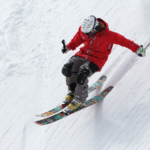



















![Coming soon: A bigger, better Boeing bird, the 777x [PHOTOS]](https://www.loungtastic.com/wp-content/uploads/2023/05/ghjghj-1-300x200.png)
Great content! Super high-quality! Keep it up! 🙂
Hello there, just became aware of your blog through Google, and found that it’s truly informative.
I’m gonna watch out for brussels. I will be grateful if you continue this in future.
Lots of people will be benefited from your writing.
Cheers!
I really like reading a post that will make people think.
Also, thank you for allowing me to comment!
Hello, i read your blog from time to time and i own a similar one and i was just
wondering if you get a lot of spam comments?
If so how do you reduce it, any plugin or anything you can suggest?
I get so much lately it’s driving me insane so any help is very much
appreciated.
Hello There. I found your blog using msn.
This is a very well written article. I will
be sure to bookmark it and return to read more of your useful info.
Thanks for the post. I will definitely comeback.
I was suggested this blog by my cousin. I am not sure whether this post is written by him as nobody else know such detailed about my trouble.
You are wonderful! Thanks!
I am regular visitor, how are you everybody?
This piece of writing posted at this web page is in fact good.
I love your blog.. very nice colors & theme. Did you make this website yourself or did you hire someone to do it
for you? Plz answer back as I’m looking to create
my own blog and would like to know where u got this from.
cheers
Outpatient Alcohol Rehab Near Me http://aaa-rehab.com Alcohol Rehab Near Me http://aaa-rehab.com Drug Rehabilitation Center
http://aaa-rehab.com
Alcohol Treatment Facilities Near Me http://aaa-rehab.com Alcohol Rehab Centers http://aaa-rehab.com Alcohol Rehab Centers Near Me
http://aaa-rehab.com